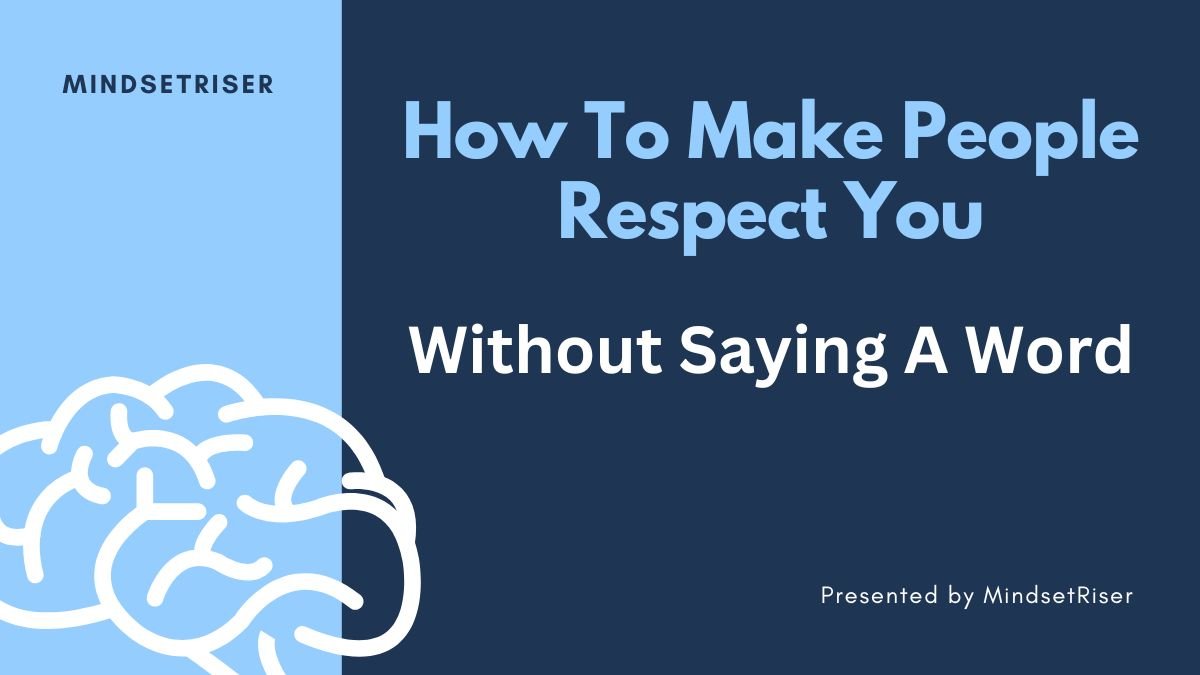How to Make People Respect You (Without Saying a Word)
How to Make People Respect You (Without Saying a Word)
Respect is one of the most fundamental elements of any successful relationship—whether personal, professional, or social. However, gaining respect doesn’t always require you to speak or assert yourself in overt ways. In fact, there are subtle yet powerful methods you can use to earn respect without saying a word. These methods stem from your actions, body language, and how you carry yourself in everyday situations.
Let’s explore the strategies that can help you make people respect you, even without speaking.
1. Be Confident in Your Actions
One of the most impactful ways to earn respect without saying anything is through confidence. When people see that you carry yourself with confidence, they are more likely to respect you because it shows that you believe in yourself and your abilities.
How to Show Confidence:
- Stand tall: Good posture sends a message of confidence and authority. Keep your shoulders back and your head high.
- Make eye contact: Direct eye contact shows that you’re present and engaged, which commands respect from others.
- Avoid fidgeting: Stay still and composed. Fidgeting can convey insecurity, whereas stillness exudes confidence.
When you walk into a room with confidence, you immediately demand attention and respect—without needing to say a word.
2. Show Genuine Interest in Others
People respect those who show genuine interest in them. When you make an effort to understand others, listen to their stories, and ask thoughtful questions, you are communicating respect without needing to speak aggressively or boastfully.
How to Show Interest:
- Active listening: Nod, maintain eye contact, and show empathy while others are speaking.
- Body language cues: Lean slightly forward to demonstrate interest and attentiveness.
- Non-verbal support: Small gestures like a smile or a gentle touch on the arm can convey warmth and respect.
By focusing on others and genuinely caring about their feelings, you can earn their respect naturally and without effort.
3. Be Consistent in Your Actions
Consistency is a key trait of someone who is respected by others. When people see that you are reliable, dependable, and true to your word, they will respect you. Consistency builds trust, and trust is a foundation for respect.
How to Be Consistent:
- Follow through on commitments: Whether big or small, always keep your promises.
- Act with integrity: Stand by your values, even when it’s difficult or inconvenient.
- Be dependable: Show up on time, meet deadlines, and be present when needed.
When people know they can rely on you, they naturally start to respect you, without you needing to demand it.
4. Practice Good Posture and Body Language
Your body language speaks volumes. How you carry yourself often communicates more about your self-worth and confidence than words ever could. People are quick to judge others based on their body language, and strong, positive body language can help you earn their respect.
How to Improve Body Language:
- Keep your body open: Avoid crossing your arms, which can seem defensive or closed off. Instead, maintain an open posture to invite interaction and create a sense of approachability.
- Use hand gestures: Confident hand gestures while listening or speaking can convey authority and assertiveness.
- Maintain a calm demeanor: Whether sitting or standing, make sure your body is relaxed but firm, which can signal confidence and control.
When you project confidence through your body language, people will instinctively respect you.
5. Dress the Part
Clothing isn’t just about style—it’s a non-verbal communication tool. How you dress can send a message about how you view yourself and how you want others to view you. Dressing appropriately and well-groomed is a subtle way to earn respect from others without saying a word.
How to Dress for Respect:
- Dress for the occasion: Whether for a professional meeting or a casual gathering, make sure your attire is appropriate.
- Choose quality over quantity: It’s not about expensive clothes, but about wearing attire that reflects your personal style and respect for yourself.
- Groom well: Keep your hair neat, and maintain good hygiene. People respect others who take care of themselves.
When you put thought into how you present yourself, people are more likely to see you as someone deserving of respect.
6. Maintain Emotional Control
People who can manage their emotions effectively tend to gain respect naturally. Emotional control signals maturity, stability, and the ability to handle challenging situations with grace. In contrast, people who lose their tempers or behave impulsively often lose respect.
How to Maintain Emotional Control:
- Don’t react impulsively: Pause before responding, especially in tense situations. This gives you time to process your emotions and respond thoughtfully.
- Stay composed under pressure: Whether dealing with criticism or stressful situations, keep calm and approach the situation logically.
- Practice patience: Take a deep breath and avoid jumping to conclusions. Patience signals maturity and respect for the process.
When you maintain emotional control, people will respect your ability to handle difficult situations.
7. Be Empathetic and Considerate
Respect isn’t just about showing confidence and authority. It’s also about treating others with kindness and consideration. Being empathetic allows you to connect with people on a deeper level, which naturally fosters respect.
How to Be Empathetic:
- Be mindful of others’ feelings: Pay attention to the emotional state of others and respond thoughtfully.
- Offer support when needed: Be there for others, even when you’re not directly involved in the situation.
- Validate others’ emotions: Let people know that their feelings matter and that you understand their perspective.
When you treat others with empathy, they will not only respect you but also feel valued in your presence.
8. Set Boundaries and Stick to Them
People tend to respect those who have clear boundaries. Setting boundaries is not about being rigid or unapproachable—it’s about communicating what is acceptable and what isn’t in a way that is respectful to both yourself and others.
How to Set Healthy Boundaries:
- Be assertive: Express your needs and preferences confidently and respectfully.
- Don’t tolerate disrespect: Stand up for yourself if someone crosses a boundary, but do so in a calm and composed manner.
- Know when to say no: Don’t be afraid to say no when something doesn’t align with your values or needs.
When you set and enforce boundaries, people will respect you for standing up for yourself.
9. Be Humble and Avoid Boasting
Confidence is important, but it should never be confused with arrogance. People respect humility, not bragging. If you have achievements or strengths, it’s important to let your actions speak for themselves rather than boasting about them.
How to Stay Humble:
- Give credit to others: Acknowledge the contributions of others and express gratitude.
- Don’t seek constant validation: Be secure in who you are without needing constant praise from others.
- Stay grounded: Keep your ego in check and be aware that everyone has their strengths and weaknesses.
When you remain humble, people respect you not just for your accomplishments, but for your attitude.
Conclusion: Earning Respect Without Words
Earning respect doesn’t require grand speeches or constant self-promotion. By embodying confidence, empathy, integrity, and emotional control, you can make people respect you without uttering a single word.
When you carry yourself with respect for yourself and others, you naturally earn the admiration and trust of those around you. Remember that actions speak louder than words, and the way you present yourself will determine how others perceive and respect you.

